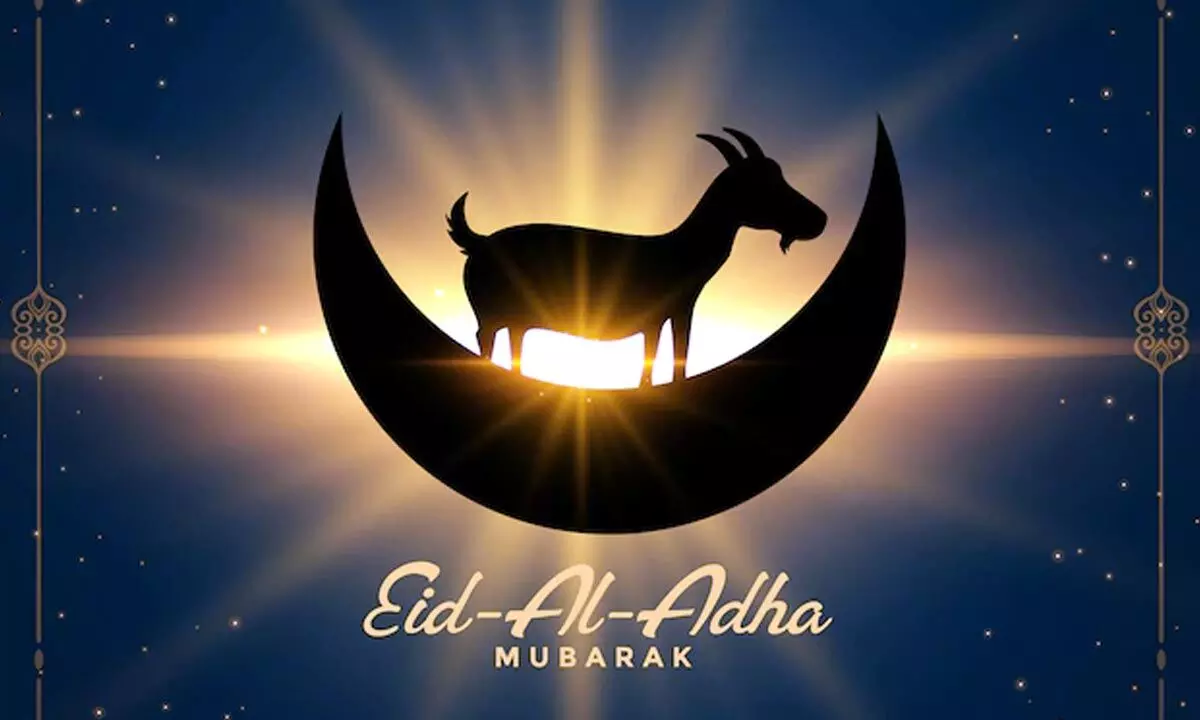Live
- Our 6 free services in Delhi pinching rivals: Kejriwal at 'Revadi par Charcha' campaign
- Abu Dhabi T10: Jos Buttler shines in debut, lauds England batters after memorable performances
- BCCI releases dates for IPL 2025 to 2027
- Centre releases Rs 448 crore as grant for rural local bodies in Karnataka
- India and Japan bolster defence ties, explore air domain cooperation
- Masik Shivratri 2024: Date, Time, Rituals, and Significance
- 8 of 10 Indian stockbrokers to increase IT budgets for emerging tech adoption
- Utpanna Ekadashi 2024: Date, Rituals, and Significance
- New Criminal Laws: An Era of Transformation of the Criminal Justice System
- India among top 10 countries with AI readiness: Report
Just In
Eid ul Adha 2024 Traditions: Bakrid Rituals, Meaning, and Spiritual Significance of Sacrifice


Eid-ul-Adha, also known as Bakrid or the Festival of Sacrifice, holds profound spiritual significance for Muslims worldwide.
Eid-ul-Adha, also known as Bakrid or the Festival of Sacrifice, holds profound spiritual significance for Muslims worldwide. It commemorates the devotion of Prophet Ibrahim (Abraham) AS, who was willing to sacrifice his son as an act of obedience to Allah (God). This festival, the second most important in Islam, emphasizes values such as faith, selflessness, and gratitude.
Traditions of Eid-ul-Adha
Eid-ul-Adha is marked by rituals that highlight sacrifice, compassion, and unity. Here are the universal traditions observed by Muslims globally:
1. Animal Sacrifice: The central ritual involves sacrificing an animal, usually a sheep, goat, cow, or camel. This act symbolizes Prophet Ibrahim's willingness to sacrifice his son, reminding Muslims of the importance of selflessness and obedience.
2. Distribution of Meat: The meat from the sacrificed animal is divided into three parts: one for the family, one for relatives and friends, and one for the less fortunate. This ensures that the act of sacrifice benefits the broader community.
3. Eid Prayer: On Eid-ul-Adha, Muslims gather at mosques or open prayer grounds for a special congregational prayer known as the Eid prayer. Led by an imam, the prayer includes specific supplications and praises to Allah, acknowledging Prophet Ibrahim's sacrifice. The imam's sermon often highlights the lessons of sacrifice, obedience, and compassion.
4. Celebration and Greetings: Eid-ul-Adha is a time of joy, bringing families and communities together. People dress in their finest attire and exchange greetings of "Eid Mubarak" (Blessed Eid).
5. Acts of Charity: Families engage in charitable acts, giving gifts, and sharing meals. It is a time for forgiveness, reconciliation, and strengthening bonds with loved ones.
6. Visiting Graves: Many Muslims visit the graves of their departed loved ones, offering prayers and seeking blessings for the deceased.
The spirit of generosity and charity is central to Eid-ul-Adha. Muslims are encouraged to support those in need by providing food, clothing, or financial assistance. Sharing the sacrificial meat fosters compassion and solidarity, reminding everyone of their responsibility to care for the vulnerable members of society.
The Meaning and Significance of Sacrifice
The origins of Eid-ul-Adha trace back to the story of Prophet Ibrahim, who received a divine command to sacrifice his son as a test of his devotion. As Ibrahim prepared to carry out the sacrifice, Allah intervened and replaced his son with a ram, signifying that Ibrahim's willingness to submit to Allah's command was sufficient.
1. Obedience to Allah: Prophet Ibrahim's willingness to sacrifice his beloved son as commanded by Allah exemplifies complete submission and obedience to God's will. The sacrifice on Eid-ul-Adha serves as a reminder for Muslims to prioritize their faith and trust in Allah above all else.
2. Lessons of Sacrifice: The festival reminds Muslims of the profound lessons from Prophet Ibrahim's sacrifice, encouraging them to embody the values of sacrifice in their daily lives by giving up their own desires, ego, and material possessions for the sake of pleasing Allah and benefiting others.
3. Trust and Faith: Prophet Ibrahim's unwavering trust in Allah's plan and his willingness to offer his son display the depth of his faith. Eid-ul-Adha emphasizes the importance of placing absolute trust in Allah's wisdom, even in challenging situations.
4. Gratitude and Remembrance: The act of sacrifice is a gesture of gratitude to Allah for His countless blessings. By sacrificing an animal and sharing the meat, Muslims express their gratitude and remember the needs of others.
5. Selflessness and Generosity: The sacrifice reflects values of selflessness and generosity. Muslims share the meat from the sacrificed animal with those in need, fostering compassion, empathy, and solidarity within the community.
6. Atonement and Spiritual Cleansing: Sacrifice is seen as a means of seeking forgiveness and spiritual purification. By acknowledging their shortcomings and sins, Muslims seek Allah's forgiveness and strive for a renewed sense of purity and righteousness.
7. Unity and Brotherhood: Eid-ul-Adha promotes unity and brotherhood among Muslims. The collective act of sacrifice and sharing the meat strengthens bonds, encourages social cohesion, and reminds individuals of their shared responsibilities towards one another.
In summary, Eid-ul-Adha encompasses obedience to Allah, trust and faith, gratitude, selflessness, generosity, atonement, unity, and the embodiment of important moral values. Through the act of sacrifice, Muslims seek to strengthen their relationship with Allah, demonstrate their devotion, and foster a spirit of compassion and empathy within their communities.

© 2024 Hyderabad Media House Limited/The Hans India. All rights reserved. Powered by hocalwire.com






